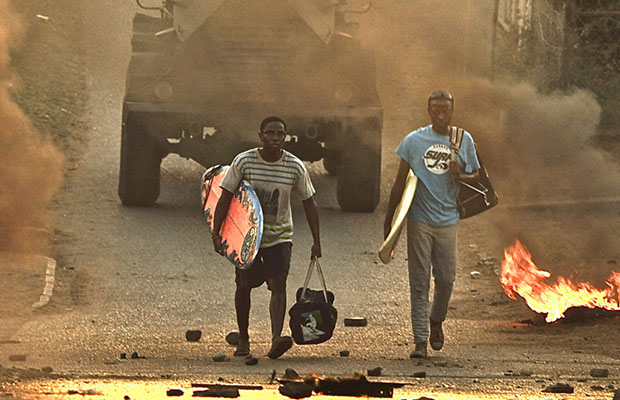South Africa struggles to lift small filmmakers


JOHANNESBURG--Jojo Maemu, had no formal experience making a movie, so it was strange that in late 2011 he stood in front of his makeshift film crew in South Africa's rural Limpopo province giving them a crash course on handling the various lights and microphones he and his co-producer were able to assemble.
Maemu had gotten further than most aspiring South African filmmakers, but the major hurdles of getting his story shot, edited and distributed were still ahead of him. With $11,000 that he saved and borrowed from family and friends, Maemu he was able to begin production of "Lerado," a love story set in Limpopo and Johannesburg.
Although the South African government has had bodies in place for years to develop the local film industry, for small producers like Maemu, that help is out of reach. They are often unaware of how to apply for funding, the application requirements are too difficult to meet and the loan minimums are too big for these small-time producers.
In 2001, South Africa's Industrial Development Corporation (IDC) established a media unit with the aim of investing in the local media industry and improving its output. The ultimate goal of the group is to help promote diversity in a field that was left closed to most South Africans for much of the country's history, and, along with other similar government programs, it has invested millions into the South African film industry over the last decade.
In fact, Basil Ford, who heads the IDC's media unit, hopes to one day make the South African motion picture industry self-sustainable. In an interview posted on the local film commission's website, Ford said that investing in South African films for South African audiences would help the "development of local stars, local stories and filmmakers. Local consumption-based local films will produce these elements.
"To help us achieve our goals, we invite all local filmmakers with locally developed scripts to approach us with their projects and we will do our best to make it happen," he said.
Still IDC funding often bypasses small films like "Lerado." In order to qualify for a loan, filmmakers must approach the organization with a professional production plan, taking into account estimated expenses and projected revenues. The application must be endorsed by an established sales agent, something that's next to impossible for some first-time filmmakers to obtain.
The minimum loan that the IDC will give out is $110,000, often much more than a low-budget production would need or could even expect to be able to pay back. Issa Sikiti da Silva, in South Africa's media publication Biz Community,lamentedthat the IDC's strict borrowing guidelines weren't "putting a dent on the country's extremely high media white ownership and concentration" by opening opportunities up to more black filmmakers in the country.
Last year South African films took in roughly $7.7 million -- a modest number by many outside standards, but a nearly 550% improvement over local sales in 2009. Industry experts creditthe improvement in the South African economy from the worst of the global recession. Others, including Ford, believe that some of that growth illustrates the success of government investment in the industry.
Zama Mkosi, the new CEO of the government-funded National Film and Video Foundation and a former member of Ford's media unit, thought that two of the biggest obstacles to growing the local film industry were a lack of films that speak to South Africans and a lack of cinemas to watch those films.
"We have not cracked the local audience," she told an industry function last year.
Mkosi added that there were "only 750 screens in SA, of which 90 percent carry Hollywood content." By comparison South Korea, a country with roughly the same population as South Africa, has over 1,800 screens. In the next few years Mkosi wants the South African film industry to produce three times the number of movies aimed at the local market and drastically increase the number of theaters that play local films.
Ford's media unit is also investing heavily in building local cinemas in black townships and rural areas throughout the country, hopefully creating a channel to distribute films like Maemu's "Lerado."
Photos: Otelo Burning
This post was originally published on Smartplanet.com